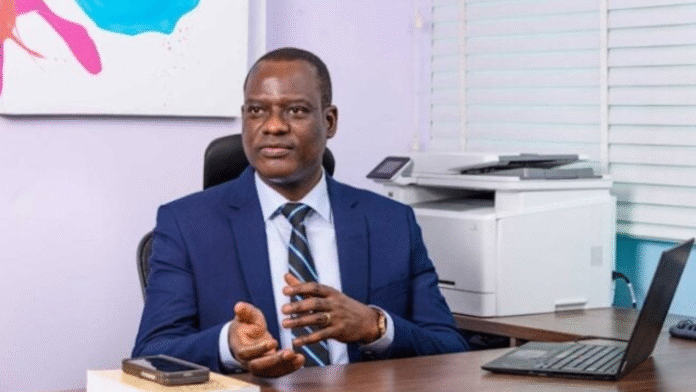Taiwo Oyedele, chairman, Presidential Committee on Fiscal Policy and Tax Reforms has revealed that Nigeria is currently collecting only 30 per cent of its potential tax revenue, leaving a staggering 70 per cent gap—one of the highest in the world.
While speaking on “Taxation for Development: Policies, Law and Implementation” at the ongoing 27th annual tax conference of The Chartered Institute of Taxation of Nigeria (CITN) in Abuja, Oyedele highlighted the deep-rooted inefficiencies plaguing Nigeria’s tax system, citing policy loopholes, widespread abuse of waivers and incentives, and weak enforcement as major culprits.
He stressed that significant tax losses are being driven by misuse of import waivers and duties.
In his view, no one should benefit from tax deductions or allowances on imported goods without first paying the corresponding duties.
To address systemic leakages, Oyedele advocated the implementation of advanced tax technology capable of real-time monitoring. He gave examples of how intelligent systems can log inventories, track sales, and flag discrepancies.
These technologies, he said, can also uncover tax evasion through inconsistencies between declared income and extravagant lifestyles, such as frequent foreign travel or luxury acquisitions.
Oyedele lamented that while a minority manipulates the system for gain, millions of Nigerians are being unjustly overburdened.
He disclosed that some of the country’s largest companies, particularly in the oil and gas sector, have official tax rates as high as 85 per cent on paper, yet many have not made any significant payments in over a decade.
This, he attributed to overly aggressive tax planning and unchecked incentives.
He challenged the morality of making billions while contributing nothing back to society, insisting that everyone must bear a fair share of the tax burden.
Addressing another dimension of the crisis, Oyedele was particularly critical of the role some tax professionals play in enabling tax evasion.
He accused certain agents of lacking both technical expertise and ethical grounding, with some allegedly selling confidential tax strategies to the highest bidder.
Such conduct, he warned, threatens the fiscal stability of the country.
To rein in malpractice and rebuild confidence, Oyedele proposed a comprehensive regulatory framework for tax practitioners.
Under this system, only accredited professionals demonstrating competence, experience, and ethical standards would be permitted to represent clients.
The reform agenda includes mandatory registration of tax agents, proof of personal tax compliance, and a traceable link between an agent and every filing they make.
He emphasised that agents who mislead clients for instance, by suggesting that VAT and withholding tax cancel each other out, would face disciplinary actions, including suspension or disqualification.
Oyedele also pushed for every business, regardless of size, to have a designated tax representative.
Drawing inspiration from best practices in the United States, Australia, Malaysia, and South Africa, he noted that these countries not only regulate individual agents but also accredit and monitor the professional bodies that certify them.
Though he acknowledged that reforms may face resistance, he argued that Nigeria’s survival depends on plugging fiscal leakages and ensuring accountability across all sectors.
Reinforcing Oyedele’s message, Abimbola Oyelola, Chief Economist and Group Head of Research at the Bank of Industry (BoI) called for stakeholders to move beyond scepticism and actively engage with ongoing fiscal reforms.
Representing Olusupo Olusi, Managing Director/Chief Executive Officer, BoI, Oyelola emphasised that the success of reforms depends on collective understanding and participation.
He warned against the risks of passivity, urging Nigerians to bridge the gap between where reforms are headed and what actions are needed to get there.
“The best way to predict the future, is to operate it—not just complain about it,” he said.
The BoI, as a leading development finance institution, reiterated its commitment to transforming Nigeria’s industrial base by offering both financial and advisory support to businesses.
This, the Chief Economist explained, is designed to organically strengthen enterprise capacity and drive national development.
Oyedele also clarified common misconceptions surrounding Nigeria’s Value Added Tax (VAT), currently set at 7.5 per cent.
“Many small business owners, he said, mistakenly believe they are personally responsible for paying VAT, when in reality, the cost is borne by clients,” he said.
He further explained that opting into the VAT system could be financially beneficial for professionals and SMEs due to potential input tax credits.
Despite criticisms, he noted that most consumer goods are now either zero-rated or exempt from VAT, reducing the burden on low-income households.
He hinted that Nigeria may eventually need to increase VAT, but only alongside policies that shield the poor.
“Earlier proposals suggested raising the rate to 15 percent, but the government decided to hold it at 7.5 percent for now,” he disclosed.
On broader tax reforms, Oyedele emphasised the need to improve personal income tax compliance.
“Efforts are underway in collaboration with the Joint Tax Board and state tax authorities to simplify the system and enhance transparency,” he added.
Currently, many tax officers operate with limited intelligence on actual taxpayer behaviour, resulting in a system that is reactive rather than proactive.
He argued that trust must replace fear in the tax system, where compliance is seen as a civic duty rather than a punishment.
Oyedele also touched on Nigeria’s regional VAT competitiveness, warning that disparities in rates across West Africa could lead to transshipment abuses.
He argued that local VAT policies must be mindful of cross-border implications.
In a nod to the future, the BoI chief outlined the institution’s efforts to foster innovation and entrepreneurship through support for tech hubs and digital platforms.
Young Nigerians, he said, are stepping forward with promising solutions and proposals that could decentralize development.
He revealed that BoI currently operates five hubs in two major cities, with plans to scale nationwide by next year.
The BoI chief called on all Nigerians—citizens, business leaders, and professionals alike to take ownership of the reform process.
He envisioned a future where paying tax is not a source of fear, but a badge of trust. “It is no longer enough to critique,” he said. “We must participate.”
BusinessDay



